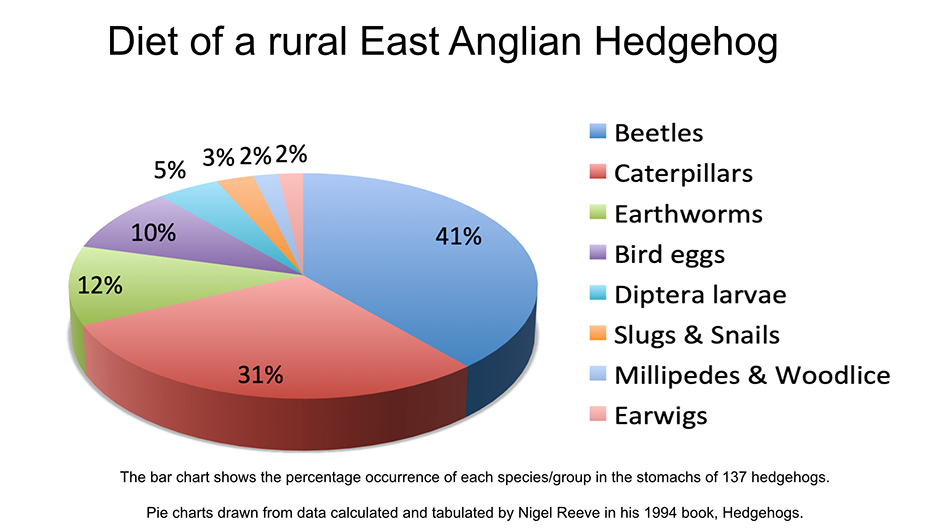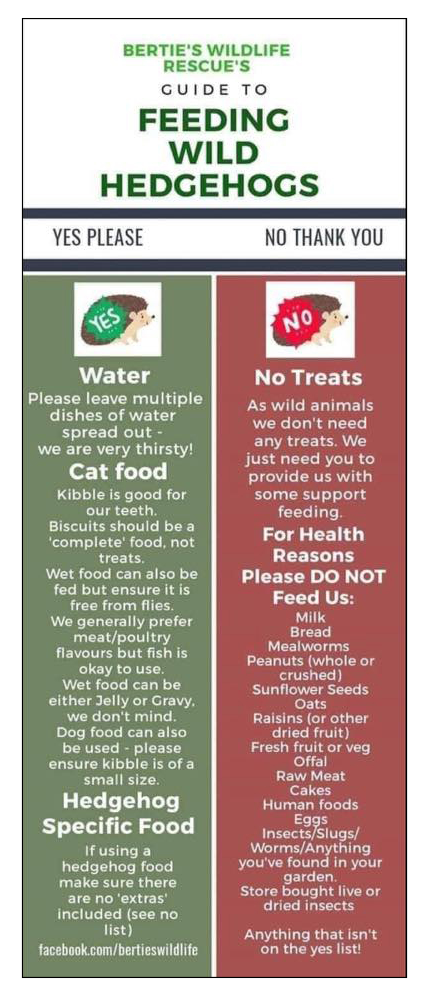What to and what not to feed Hedgehogs
 If there is one thing that really gets discussed a lot on most Hedgehog forums is what supplementary food should you put out for Hedgehogs. The advice from the British Hedgehog Preservation Society is that supplementary feeding can help our hedgehogs especially before the start of the winter hibernation as it can help to build up the fat reserves needed for winter hibernation.
If there is one thing that really gets discussed a lot on most Hedgehog forums is what supplementary food should you put out for Hedgehogs. The advice from the British Hedgehog Preservation Society is that supplementary feeding can help our hedgehogs especially before the start of the winter hibernation as it can help to build up the fat reserves needed for winter hibernation.
We have to be careful as to what food we put out for hedgehogs as certain foods in large quantity can in fact be detrimental to the health and well being of our native hedgehogs.
If we are going to give hedgehogs supplementary food then perhaps the best place to start is to look at what an average hedgehog eats in its diet in the wild as this will give us an idea as to what types of food are best for our hedgehogs.
What do Hedgehogs eat?

As you can see from the chart above that our hedgehogs eat mainly beetles, caterpillars and earthworms. Therefore the best way that we can help them before even thinking of providing supplementary food is to provide that natural food source through making our gardens & parks wildlife friendly with plenty of different habitats that will encourage all manor of invertebrates for hedgehogs to eat. See our page here on how to make your garden hedgehog friendly. For more information on a Hedgehog's diet have a look at this page on the wildlifeonline.me.uk site.
What TO put out as supplementary food
 Unfortunately at certain times of the year such as in early spring when hedgehogs come out of hibernation, during times of drought and in late autumn when hedgehogs are getting ready for hibernation their natural food sources are not abundant and we need to supplementary feed them. As you can see from the pie chart above the hedgehogs main food is meat type protein, therefore any supplementary food that we give them must be predominately meat based.
Unfortunately at certain times of the year such as in early spring when hedgehogs come out of hibernation, during times of drought and in late autumn when hedgehogs are getting ready for hibernation their natural food sources are not abundant and we need to supplementary feed them. As you can see from the pie chart above the hedgehogs main food is meat type protein, therefore any supplementary food that we give them must be predominately meat based.
- Wet meat based cat or kitten food either in jelly or gravy (although you can give them fish based cat food but most hedgehogs prefer meat flavoured cat food).
- Dried Cat & kitten biscuits
- Preparatory hedgehog kibble
When feeding Cat biscuits try and give a mixture of adult and kitten. If you only feed kitten, it's likely it will artificially and too quickly fatten hedgehogs especially adults and it can cause a lot of extra fat deposits.
Please be aware that wildlife food is not regulated unlike pet food and therefore some preparatory foods that are advertised as made for feeding hedgehogs may not contain the best ingredients suitable for Hedgehogs. Some Hedgehog foods contain wheat as the main ingredient, this is just a filler and has no nutritional benefit to hedgehogs as they cannot digest wheat. Others may contain mealworm, nuts or other ingredients that are not suitable for hedgehogs (see the what not to feed hedgehogs below). Therefore check out the ingredients list carefully on all hedgehog foods.
Don't forget TO put out some water
Lastly don't forget that you if you are feeding hedgehogs (particularly if you are feeding them dried food) that you must also put out a shallow dish of fresh water for our hedgehogs. You need to make these available for the hedgehogs all the year round. Unfortunately so many of our hedgehogs particularly in our dry summers can easily suffer from dehydration due to the lack of suitable places to drink water from.
We have several shallow ceramic dishes dotted about our garden. One of my nightly rituals after servicing the feeding stations is to walk around the garden with a watering can and topping them all up with fresh rainwater from one of our water butts.
Hedgehogs are opportunist feeders and will feed on anything even if it is not good for them, it is a bit like us and junk food or chocolate we like the taste of it but it doesn't do us any good. Unfortunately if eaten in large quantities these foods can have a quite detrimental effect on the hedgehogs.
Don't feed them the following:
- Mealworms - If they eat too much and too often hedgehogs can get MBD (Metabolic Bone Disease - see video below)
- Dried fruit, such as raisins or sultanas.
- Dried nuts, such as peanuts, sunflower seeds or sunflower hearts.
- Processed meats, such as ham and bacon - it has a very high salt content.
- Oats
- Milk - Hedgehogs are lactose intolerant.
- Bread
- Raw meat
- Offal
- Cakes or other human foods.
- Eggs
As well as not feeding meal worms, it's the same for calci worms and black solider larvae. They are all way too rich in calcium and they all can cause an imbalance in the calcium v phosphorus ratio which can lead to MBD.
 Feeding Garden Birds and Hedgehogs
Feeding Garden Birds and Hedgehogs
If you are like us and you like to feed your garden birds then you will need to think about the waste that can be created underneath your bird feeders. If you watch some birds in particular Gold Finches you will see that they often select a piece of sunflower heart spit it out and select another one. You then end up with a lot of sunflower hearts on the ground beneath the bird feeders.
Unfortunately hedgehogs will feed on this waste under your bird feeders and once they know it is there they will come back for it and as we have mentioned above sunflower hearts are not very good for hedgehogs. Often ground feeding birds such as Wood pigeons, Collared Doves, Blackbirds and Starlings will eat the fallen sunflower hearts but in our experience a lot of it is left on the ground and it is difficult to clear up. If left it can also go moldy which isn't good.
To counteract this problem we have fitted large circular plastic trays to the bottom of all of our bird feeders, they are available from several firms that sell bird feeders. We have found that these work very well and catch any split or fallen sunflower hearts which are then eaten by the ground feeding birds which due to their size they can land on them. They trays are easily removed so that they can be cleaned and sterilised on a regular basis to prevent the spread of bird diseases.
If you like to feed mealworms to your birds, please don't place these directly on the ground but put them on a bird table or on a tray that is well off the ground and out of reach by hedgehogs.
Metabolic Bone Disease
To explain a little bit about Metabolic Bone disease. For every milligram of Phosphorus a hedgehog consumes, it must consume another milligram of calcium. If they don’t then calcium gets taken from their body’s calcium stores such as their bones and teeth in order to balance the phosphorus out. If too much calcium is taken out of the bones and teeth then they become weakened. A healthy balance is a Ca:P ratio of 2:1, 1:1 or at most 1:2. Higher amounts of phosphorus cause problems unfortunately mealworms have a Ca:P between 1:7 and 1:11, Peanuts have a Ca:P of 1:6 and Sunflower hearts Ca:P of 1:7. Therefore the problem is to do with the Calcium/Phosphorus ratio (Ca:P) in foods which can actually strip calcium from the hedgehogs body. This explains why Hedgehog rescues are seeing Hedgehogs with deformed and ‘bendy’ bones.
The video below rather graphically shows the effect that Metabolic bone disease can have on the bones of a hedgehog.











